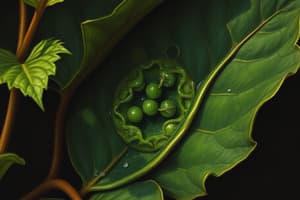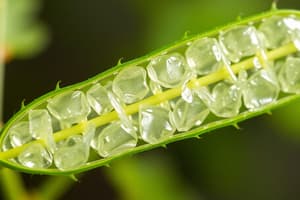Podcast
Questions and Answers
What type of cells contain chloroplasts?
What type of cells contain chloroplasts?
plant cells
What is the energy Autotrophs use to make their own food?
What is the energy Autotrophs use to make their own food?
sunlight
What are the raw materials for photosynthesis?
What are the raw materials for photosynthesis?
carbon dioxide & water
What simple sugar is produced for photosynthesis?
What simple sugar is produced for photosynthesis?
What gas is used in photosynthesis?
What gas is used in photosynthesis?
What gas is released during photosynthesis?
What gas is released during photosynthesis?
Where are the most photosynthetic cells in plants found?
Where are the most photosynthetic cells in plants found?
About how many chloroplasts can be found in photosynthetic cells?
About how many chloroplasts can be found in photosynthetic cells?
How many membranes surround a chloroplast?
How many membranes surround a chloroplast?
The outer membrane of a chloroplast is?
The outer membrane of a chloroplast is?
What are the individual sacs formed by the inner membrane of a chloroplast called?
What are the individual sacs formed by the inner membrane of a chloroplast called?
How are thylakoids arranged?
How are thylakoids arranged?
What pigment is found inside a thylakoid and what color is it?
What pigment is found inside a thylakoid and what color is it?
What are other pigments that trap sunlight called?
What are other pigments that trap sunlight called?
What colors are accessory pigments?
What colors are accessory pigments?
Stacks of thylakoids are called?
Stacks of thylakoids are called?
Stacks or grana are connected to each other by?
Stacks or grana are connected to each other by?
Why are mitochondria called the Powerhouse of the cell?
Why are mitochondria called the Powerhouse of the cell?
What cell process occurs in the mitochondria?
What cell process occurs in the mitochondria?
Why do some cells have more mitochondria? Give an example.
Why do some cells have more mitochondria? Give an example.
What simple sugar is broken down in the mitochondria?
What simple sugar is broken down in the mitochondria?
Where does the energy in glucose come from originally?
Where does the energy in glucose come from originally?
Where is the energy stored in glucose?
Where is the energy stored in glucose?
Why is cellular respiration an aerobic process?
Why is cellular respiration an aerobic process?
What energy is released when the chemical bonds of glucose are broken?
What energy is released when the chemical bonds of glucose are broken?
Name two other organelles besides the mitochondria that contain DNA and have a double membrane.
Name two other organelles besides the mitochondria that contain DNA and have a double membrane.
Why is the inner mitochondrial membrane folded?
Why is the inner mitochondrial membrane folded?
What are the folds in the inner mitochondrial membrane called?
What are the folds in the inner mitochondrial membrane called?
What does ATP stand for?
What does ATP stand for?
What three main things make up an ATP molecule?
What three main things make up an ATP molecule?
How many high-energy bonds does ATP contain?
How many high-energy bonds does ATP contain?
Where are the high-energy bonds found in ATP?
Where are the high-energy bonds found in ATP?
What helps weaken high-energy bonds so energy can be released and then later help reform them?
What helps weaken high-energy bonds so energy can be released and then later help reform them?
What is released when ATP loses a phosphate group? What forms?
What is released when ATP loses a phosphate group? What forms?
What is the energy molecule of a cell called?
What is the energy molecule of a cell called?
What macromolecule made by plants is 'burned' in the mitochondria?
What macromolecule made by plants is 'burned' in the mitochondria?
Where is chlorophyll found in the chloroplast?
Where is chlorophyll found in the chloroplast?
In which part of a plant would you expect to find the most chloroplasts?
In which part of a plant would you expect to find the most chloroplasts?
What are the raw materials for photosynthesis?
What are the raw materials for photosynthesis?
What product of photosynthesis is used in cellular respiration?
What product of photosynthesis is used in cellular respiration?
What is an advantage of having a folded inner membrane in the mitochondria?
What is an advantage of having a folded inner membrane in the mitochondria?
What is the energy for photosynthesis?
What is the energy for photosynthesis?
Besides chlorophyll, what other pigments are found in the chloroplasts?
Besides chlorophyll, what other pigments are found in the chloroplasts?
Carbon dioxide & water combine to produce what?
Carbon dioxide & water combine to produce what?
Flashcards are hidden until you start studying
Study Notes
Photosynthesis Key Concepts
- Chloroplasts are found in plant cells, enabling photosynthesis.
- Autotrophs use sunlight as energy for food production.
- Raw materials for photosynthesis are carbon dioxide and water.
- Glucose is the simple sugar produced during photosynthesis.
- Carbon dioxide is used, while oxygen is released as a byproduct.
Structure of Chloroplasts
- Most photosynthetic cells are concentrated in leaves.
- Each photosynthetic cell contains thousands of chloroplasts.
- Chloroplasts are surrounded by two membranes.
- The outer membrane is smooth, while the inner membrane forms thylakoids.
- Thylakoids are stacked in structures called granum, connected by lamellae.
Pigments in Photosynthesis
- Chlorophyll is the primary pigment within thylakoids, reflecting green light.
- Additional pigments known as accessory pigments capture light and can appear yellow, red, orange, or brown.
Role of Mitochondria
- Mitochondria are known as the powerhouse of the cell because they break down glucose, releasing energy.
- Aerobic respiration occurs within mitochondria, relying on oxygen.
- Active cells, such as muscle cells, typically have more mitochondria.
Energy Conversion
- The energy in glucose originates from the sun, stored in chemical bonds.
- Cellular respiration requires oxygen, making it an aerobic process.
- Energy released from broken glucose bonds is stored as ATP (Adenosine Triphosphate).
ATP Structure and Function
- An ATP molecule consists of a nitrogen-containing base, sugar, and three phosphate groups.
- It contains two high-energy bonds located between its phosphates.
- Enzymes facilitate the breaking of high-energy bonds to release energy.
- Losing a phosphate group converts ATP to ADP and releases energy.
Organelles and DNA
- Both nucleus and chloroplasts contain DNA and have a double membrane structure.
- The inner mitochondrial membrane is folded into cristae to increase surface area for energy production.
Photosynthesis and Cellular Respiration Connection
- Photosynthesis produces glucose, which is utilized in cellular respiration.
- The process combines carbon dioxide and water to yield glucose and oxygen.
Summary of Essential Functions
- Having a folded inner membrane in mitochondria enhances surface area for greater energy production efficiency.
- The energy for photosynthesis is derived from sunlight, driving the transformation of raw materials into glucose and oxygen.
Studying That Suits You
Use AI to generate personalized quizzes and flashcards to suit your learning preferences.




